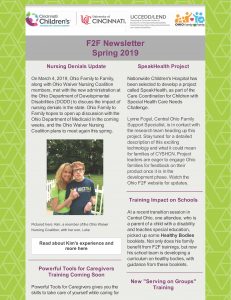 Supporting Families of Children with Special Healthcare Needs (CYSHCN) whose Nursing Services have been Denied
Supporting Families of Children with Special Healthcare Needs (CYSHCN) whose Nursing Services have been Denied
Our goal is to educate and advocate for nursing care solutions and policy changes that sustain and/or improve the health and safety of children and adults with intensive medical needs and developmental disabilities. The Ohio Nursing Coalition was formed to work on this project. You can read more about the coalition by clicking on our recent newsletter to the left.
Background:
In 2016, Ohio’s Departments of Medicaid (ODM) and Developmental Disabilities (DODD) changed their nursing care policies for people who were being moved from TDD Waiver to Individual Options (IO) Waiver. This left many families with reduced nursing care hours or no more nursing care (nursing care denials) for their children who have intensive medical needs (such as requiring suctioning, tracheostomy care, continuous respiratory assessments, vest treatments, ventilator support, continuous neurological assessments, etc.) and who have developmental disabilities.
In order to address this issue, OH F2F has led various conversations with families, guardians, and multiple state agencies since April 2018 to find better solutions for these families.
During these conversations, we learned why families appeal ODM and DODD denial of nursing services. The services that were denied had been ordered by their physicians and deemed medically necessary to maintain health and safety of the child or adult with developmental disabilities. These family members and their physicians agree that these services are necessary. Many families who have been denied nursing services report that their only alternative is to use Homemaker Personal Care (HPC) with Delegated Nursing. Families are confused and have few resources in finding qualified HPC staff who are competent and confident in caring for someone who has more intensive medical needs. For now, Medicaid and DODD have agreed to keep nursing care intact (also called “stay put”), while families are in the midst of the appeals process as long as families were actively trying to find HPCs.
What is not working?
- The current statewide shortage of direct support professionals leaves families with a small (almost non-existent) pool of possible providers who can provide delegated nursing tasks
- Rigid legislative rules cause pressure on families to learn the rules while under tight timelines of state’s appeals process
- Financial stress on families to hire attorneys who could help them appeal the state decisions and navigate through very complex and confusing legal processes
- County boards of developmental disabilities and the service and support administrators are often just as confused as families about the appeals process and can only provide facts about the individual’s case
- Insufficient communication with families during the appeals process (examples: very little to no advance notice from the state attorney with written background information, no notice of rescheduling appeal hearings, etc.)
- By the time the families get through appealing their case, their loved one may already be up for redetermination for the next year’s needed nursing services
- Nursing agencies are leery of continuing services for clients because of the fear that funding/services will not get approved
Result: a lack of support from the very services and systems that were designed for the health and safety of those who have intense health care needs
Possible solutions for families who need nursing and health services for their loved ones:
- Some families who can afford to hire attorneys have won their appeal cases because their attorney did the leg work and understood the medical judgements that authorize nursing services
- Some families are able to use both nursing services and delegated nursing services within the rules. This scenario usually requires a great deal of time invested by the parent/guardian to manage the services and staff. This also requires the parent/guardian to have a very large network to rely on, as well as living in a larger metropolitan area that has a sizeable pool of agencies and nurses. The county board SSA is usually very savvy as well.
What can families do?
- Understand the rules and appeals process
- Keep a daily log of all of the medical judgements you make while caring for your loved one (similar to a Nursing Task Assessment)
- Learn about and use the health services that are available under the Ohio Medicaid State Plan and the Waiver services
- Get involved and advocate for change and solutions
- Reach out for support and tell your story
Resources:
- ORC (Ohio Revised Code) Rules & Appeals, Medication Administration and Nursing Delegation Resource, Video Call Guidance for Nursing Services
- Understanding the definition of Delegated Nursing. “Delegation” means the transfer of responsibility for the performance of a selected nursing task from a licensed nurse authorized to perform the task to an individual who does not otherwise have the authority to perform the task.
- Medical Procedures Log
- Health Services – PPT
- Use resources and tools, like this one, to help you think about all the options
- Get Involved & Advocate – write to the local press and to your local legislators about these issues; contact state officials
- Reach out – Contact Us
